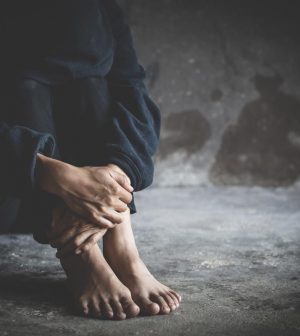- Could Your Grocery Store Meat Be Causing Recurring UTIs?
- Are You Making This Expensive Thermostat Error This Winter?
- Recognizing the Signs of Hypothyroidism
- 10 Strategies to Overcome Insomnia
- Could Artificial Sweeteners Be Aging the Brain Faster?
- Techniques for Soothing Your Nervous System
- Does the Water in Your House Smell Funny? Here’s Why
- Can a Daily Dose of Apple Cider Vinegar Actually Aid Weight Loss?
- 6 Health Beverages That Can Actually Spike Your Blood Sugar
- Treatment Options for Social Anxiety Disorder
One Day of the Week Has Highest Suicide Risk

A “case of the Mondays” is more perilous than just the return-to-work blues, a new study warns.
Suicide risk is highest on Monday in the United States and around the world, an international team of researchers has discovered.
“Mondays and New Year’s Day were both associated with increased suicide risk in most countries,” concluded the team led by Yoonhee Kim, an associate professor with the University of Tokyo’s Department of Global Environmental Health.
Mondays constitute 15% to 18% of total suicides, compared with other days, researchers found.
Results also show that weekend suicide risk varies greatly between countries.
Suicide risk is lowest on Saturdays or Sundays in many countries across North America, Asia and Europe. However, suicide risk increases during the weekend in South and Central American Countries, Finland and South Africa.
For the study, researchers analyzed suicide data for 740 locations in 26 countries and territories from 1971 to 2019, including more than 1.7 million suicides.
Previous studies have shown that suicide risk differs by day of the week, but results have been inconsistent, researchers said in background notes.
Suicide risk increased on New Year’s Day in all countries, especially in men, the results showed.
The researchers said there are several potential explanations for the increased suicide risk on Mondays and New Year’s Day.
One is the “broken-promise effect theory,” which holds that people experience a negative mood when things don’t go as planned. In essence, a bad weekend or a trying year causes an intense feeling of depression or despair that increases suicide risk.
The beginning of the week might also increase work pressure and stress, a phenomenon called “Blue Monday,” researchers said.
It also could be that people drink more on the weekends and on New Year’s Day, which is considered a major risk factor for suicide, researchers added.
“Notably, our study showed that men who died by suicide were more affected by the day of the week and New Year’s Day compared with women,” the researchers wrote.
The new study was published Oct. 23 in the BMJ.
Men are more susceptible to isolation and stress, while women typically have a bigger and more diverse social support system, researchers said.
If you or a loved one are experiencing a suicidal crisis or emotional distress call the Suicide and Crisis Lifeline at 988.
More information
The U.S. Centers for Disease Control and Prevention has more on risk factors for suicide.
SOURCE: BMJ Group, news release, Oct. 23, 2024
Source: HealthDay
Copyright © 2026 HealthDay. All rights reserved.










